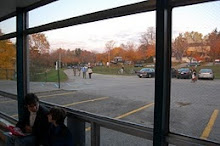If anonymous comments from officials are to be believed, the US House has come up with a stimulus package. Any increased borrowing is reckless, but at least some of this borrowing will benefit the needy. The deal to make rebates available to the working poor in exchange for not doing anything for people with no earned income seems reasonable.
We need to step back and ask how we got in a position to need to borrow money for a stimulus package. We need a stimulus package because GDP is growing around 1% instead of around 3%. But why is 1% growth a crisis? It's a crisis only because so much of the economy operates with no breathing room.
We like to save our money in stocks because they provide higher returns than bonds or money market accounts. This additional return is a risk premium: higher returns in exchange for increased risk. Stocks are priced based on their current earnings and investors' opinion of their future earnings. If investors' opinion of future earnings goes down, we watch our portfolios sink.
This is not so bad because maybe next year things will turn around and our portfolios will grow to new highs. The problem comes when we accept the risk premium but can't tolerate the risk.
This affects consumers with little savings and who spend all the money they make even more so. If the economy stops expanding (around 0% growth for a few quarters) and that affects their jobs or businesses, they are quickly in a personal crisis.
Why have we set up our society such that if we produce the same amount as last year, it is a crisis?
It is a mystery why people behave this way. How much benefit do investors get from taking a little more risk than they should? How much benefit do consumers get from spending all the money they make instead of just 80% of it. Some commentators say there's a middle-class squeeze and people earning the median income cannot afford to consume only 80% of what they earn. These commentators should ask all the people who happen to earn 80% of the median income how they do it.
Whatever the psychology behind this behavior, it would do us good to consider the long-term consequences of our financial decisions. When the US decided to invade and occupy two countries at the same time and pay for it by borrowing, it indirectly decided not to spend as much on future endeavors like healthcare, education, or the next military action. When people borrow money, they indirectly decide to forego the option of more time with friends and family and to increase the impact of blips in the economy or in their lives.
These decisions are not bad, as long as they're recognized as decisions. Unfortunately, people have been living on the edge for so long, they don't even recognize they're making these tradeoffs. Maybe many Americans are in a precarious financial situation that justifies more borrowing, in the form of government deficit spending, to keep the whole thing going. Maybe this problem here-and-now is more important than things like shoring up Social Security and Medicare in the future.
We need to ask how long we want to keep living like this. We know markets go up and they go down. We know GDP goes up and on occasion goes down. We should plan for it, and act accordingly. It will make us happier in the good times and more resilient against any peril we may face in the future.
Subscribe to:
Post Comments (Atom)


No comments:
Post a Comment